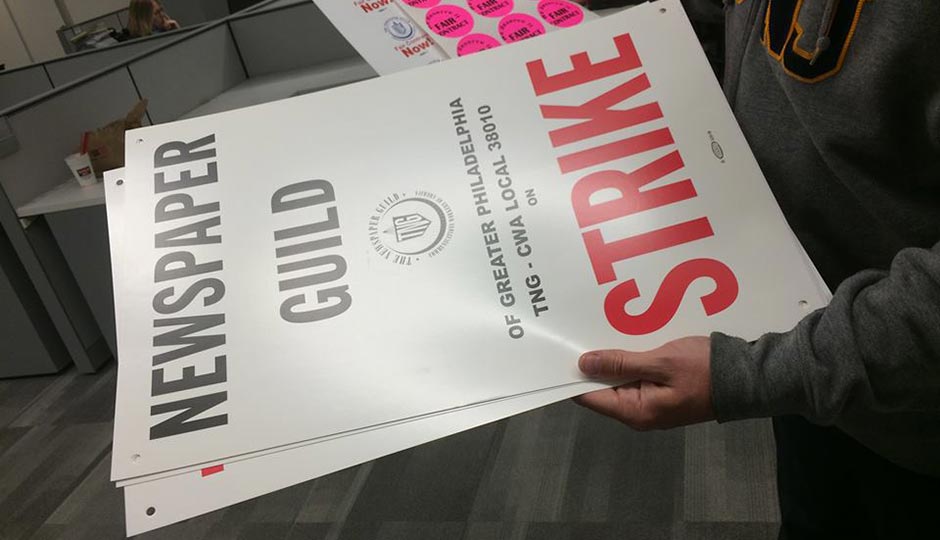Could Philly Newspapers Survive a Strike?

The Newspaper Guild has already printed picket signs in case of a possible strike.
Philadelphia’s two major daily papers — the Inquirer and Daily News, along with their online cousin Philly.com — have survived one calamity after another over the past decade: A radical decline in revenues and circulation, bankruptcy, repeated changes of ownership and repeated airings of dirty laundry.
But can they survive a strike by the Newspaper Guild?
As others have noted, newspaper strikes used to hit this town all the time. But that was back when the newspaper industry was relatively flush. These days? Not so much the case. Yes, employees at Philadelphia Media Network are getting a profit-sharing check this year, but nobody would argue that the business, in Philly and elsewhere, is anything but fragile, and perhaps brittle.
Which raises a question for the journalists, ad sales personnel, circulation and support staffers who are now contemplating walking off the job: Would they have a job to return to?
Outside observers aren’t so sure.
“There might be some element of mutually assured destruction were they to do that,” said C.W. Anderson, an assistant professor at City University of New York; he embedded at Philadelphia papers for his book Rebuilding the News. “It would do serious damage to the papers … but it would test the union as well. It would be a pretty serious step for both sides.”
Certainly, both sides sound increasingly ready to test the prospect.
“If the papers can’t afford a strike, they shouldn’t force one,” Bill Ross, executive director of the Newspaper Guild, told Philly Mag. “Our members have done enough since 2006 to help the company survive.”
“Rest assured that even if they do strike, we will continue to print and deliver important news, interesting features and valuable online content to serve the readers, subscribers and advertisers of the Philadelphia Inquirer, Daily News and Philly.com,” Philadelphia Media Network management said in a Wednesday afternoon email to employees. (See the full text here.)
One possible scenario? The company and its journalists could end up competing against each other, with PMN still producing content on Philly.com — and strikers offering their own takes on a pop-up website. Starting a website, after all, can be a cheap, even free proposition.
Even in the pre-Internet era, a newspaper strike could shut down a seemingly thriving newspaper. A months-long strike by Teamsters in 1992 ended with the Pittsburgh Post-Gazette buying out and shutting down the Pittsburgh Press, until then the larger of the two papers.
The last major newspaper strike? As far as anybody can tell, it happened a decade ago, at the Youngstown Vindicator in Ohio.
“If you go back a few decades, a strike was often a fight between two strong parties,” said Joshua Benton, director of the Nieman Journalism Lab at Harvard University. “Both institutions (newspapers and their unions) have been weakened by economic shifts the last few decades. I don’t think it’s a coincidence you’ve seen a decrease in strikes. Times are tough on both sides.”
“The era when there were a lot of newspaper strikes, the strikes were premised on: These are very profitable enterprises,” added Rick Edmonds, a former Inky reporter who now covers the newspaper industry for the Poynter Institute. “I don’t think any of that is true anymore.”
One factor that argues for the survival of the papers in the event of a strike: They’ve already survived so much. Even in the midst of industry decline, Edmonds points out, only a few newspapers have actually closed — most have proved nimble enough, so far, to survive.
He’s hopeful, however, the two sides might avert a potentially disastrous walkout.
“Whether the threat of a strike might bring the two sides together, that’s sometimes the case,” he said.
Similarly, Benton notes that old-school newspaper strikes could go on for weeks and months. Neither side, he said, has the resources to endure that this time. Should a strike occur, he said, “they’ll be interested in finding a settlement quickly.”
The strike authorization vote could come next week. The Newspaper Guild’s contract expires June 27th.
Follow @JoelMMathis on Twitter.


